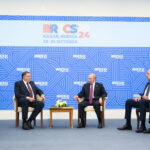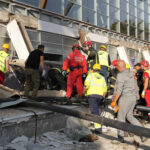- Vučić invites Trump to Serbia
Serbian President Aleksandar Vučić had a call with US President-Elect Donald Trump on November 10.
“The conversation was wonderful and meaningful, I would say very cordial,” Vučić noted in a post on Instagram.
He also noted that he expressed his hope to Trump that he would visit Serbia, because “Serbia was the country where the support for the election of President Trump was the highest in all of Europe.” According to Vučić, Trump “thanked for the huge support he received from the citizens of Serbia, from the Serbian people.”
“I also believe that in the near future we will be able to discuss the further improvement of our relations in all areas,” the Serbian president emphasized. Trump “will be able to make America great again, and that we will be able to make Serbia a decent country and a country that will be able to cooperate well, very well with the United States,” said Vučić.
Serbian Interior Minister Ivica Dačić considers the conversation between Vučić and Trump to be “an indicator of great closeness and trust” between the two, as well as evidence that Belgrade “will have good relations with the future administration.”
- Next meeting of the European Political Community to be held in Tirana
The next, sixth meeting of the European Political Community (EPC) will be held in May 2025 in Tirana, Albania.
This was agreed upon by 47 heads of state and government of the EU member states during the fifth meeting in Budapest.
“We have all undertaken to be the guests of Prime Minister Edi Rama in Tirana, Albania, next May,” said Hungarian Prime Minister Viktor Orbán, who held a joint press conference with the Prime Minister of Albania, Edi Rama, following the Budapest Summit.
Rama, in turn, emphasized that “it will be a great privilege to work as a team and make the next meeting in Tirana as successful as the one in Hungary.”
It is expected that the summit of the European Political Community in Tirana, apart from its pan-European significance, will also contribute to the European integration of Albania.
- Vučić believes aid to Ukraine more important for European integration than sanctions against Russia
At the summit of the European Political Community in Budapest, Serbian President Aleksandar Vučić was outraged that the European Union is not interested in Serbia’s European integration due to Belgrade’s refusal to align with EU’s Russia sanctions. “We don’t need Serbia. Why? Because Serbia did not impose sanctions against Russia,” said Vučić, commenting on the EU’s position.
However, in his opinion, it is not bureaucracy that is more important today, but actual actions, stressing that Serbia has provided humanitarian aid to Ukraine in the amount of EUR 52 million. Vučić noted that Serbia’s aid is small compared to Germany and the US, the big countries, but if compared even with some of the larger EU nations and with all the countries of the Western Balkans, Serbian support is much larger.
“We didn’t impose sanctions against Russia, but when you look at our aid to Ukraine, when you look at other countries or the Western Balkans, my question is whether the formal bureaucratic approach or the substance has always been more important,” Vučić said.
As is known, after Russia’s full-scale invasion of Ukraine, the negotiation process regarding Serbia’s accession to the EU has actually been suspended, and no new negotiation chapters have been opened. The main claim from Brussels to Belgrade is an unaligned foreign and security policy in the wake of Serbia’s refusal, as a candidate for EU membership, to introduce sanctions against the Russian Federation.
- Defense ministries of South-East Europe convene for summit
Representatives of the defense ministries of South-Eastern European countries and regional security organizations held another meeting within the SEDM (South-East Europe Defense Ministerial) Process in Tirana, Albania, on November 5-7.
The South-East Europe Defense Ministerial (SEDM) process was launched in 1996 to promote constructive regional military cooperation with the aim of consolidating and enhancing stability and security in the region. Romania chairs the SEDM in 2023-2025. Other member states are Albania, Bulgaria, Bosnia and Herzegovina, Greece, Georgia, Italy, Moldova, North Macedonia, Serbia, Slovenia, USA, Turkey, Ukraine, Croatia, and Montenegro.
The meeting in Tirana discussed the future of the SEDM Process, as well as the impact of current armed conflicts on regional security. All participants reaffirmed their commitment to joint SEDM projects that will further strengthen political and military cooperation in South-East Europe.
After the meeting, the SEDM member states adopted a Joint Communiqué with information on the operation of the SEEBRIG Brigade and SEDM in general, through developing both existing and new programs and initiatives, and emphasizing the countries’ commitment to the fundamental principles and norms of international law, respect for the sovereignty and territorial integrity of the countries participating in the Initiative. (SEEBRIG, Southeast Europe Brigade, is a multinational unit that includes forces from Albania, Bulgaria, Greece, North Macedonia, Romania, and Turkey. It was established as part of NATO’s Partnership for Peace initiative.)
As part of the SEDM Process, Serbia has assumed the role of a leading country in the project “The role of women leaders in the field of defense and security”. An international conference will be held in Belgrade, as announced. The delegation of the Ministry of Defense of Serbia was headed by Acting Assistant Minister of Defense for Defense Policy Predrag Bandić.
- Montenegro to buy patrol boats in France
The Minister of Defense of Montenegro, Dragan Krapovic, signed a contract for the purchase of two OPV 60 patrol boats worth EUR 120 million from the French company Keršip.
The contract is based on the agreement on bilateral military cooperation between Montenegro and France, signed in Paris on April 3. The Offshore Patrol Vessel (OPV) ships designed for patrol and surveillance in the open sea and along the coast will be delivered by the end of 2026. They are suitable for carrying out combat missions, as well as protecting maritime borders, including in the fight against illegal migration.
The purchase of French patrol ships is Montenegro’s largest military investment since the country gained independence in 2006. Currently, the Montenegrin Navy still operates ships that were inherited from the Yugoslav People’s Army.
After receiving the OPV 60 boats, Montenegro will be able to take an active part in NATO maritime missions.



